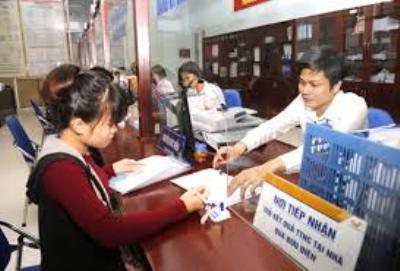
Commune-level civil servants are meeting people
Above are the requirements of regulations on how to
recruit the civil servants in the province’s communes, wards and townships that
have just been issued by the provincial People’s Committee under Decision no.
13. The regulations are applied to communal-level civil servants and are stated
in Clause 3, Article 61, Law on Officials and Civil Servants in 2008 including 7
titles: communal police chief (where there are no official police positions),
military commander, office - statistics, land management - construction -
environment and urban areas (for wards and townships) or land management -
agriculture - construction and environment (for communes); finance - accounting,
justice - residence, and culture - society.
Also, the decision outlines the principles and
grounds for recruitment. Accordingly, recruiting commune-level civil servants
must be based on task requirements, job title standards and the number of civil
servants that have been approved by the People’s Committees of districts and
cities.
Recruitment must ensure that people of good conduct
and talents meet all the requirements and tasks in accordance with the required
professional skills and tasks through training and fit job positions.
For localities with registration numbers of less
than 20 people, they can coordinate with other localities to organize joint
recruitment; the implementation method and order must be consistent with the
provisions of legal documents.
The general recruitment must comply with the
government’s Article 3 of Decree no. 112/2011/ND-CP on the civil servants of
communes, wards and townships; registration requirements for recruitment and
priority in recruitment must comply with Article 6 of Decree no. 112 and Article
3 of Circular no.13/2019/TT-BNV; and Clause 2, Article 1 of Decree no.
34/2019/ND-CP.
Also, decisions of the provincial People’s
Committees stated the details of methods, competence, methods of recruiting,
testing and selecting commune-level civil servants in the province.
The provincial People’s Committee assigned
Department of Internal Affairs to host and coordinate with concerned agencies
and units, and show the People’s Committees of districts and cities to develop
questions and answers for tests and exams; follow, check, and monitor the
process of organization and implementation.
Military, office - statistics, land management -
construction - environment and urban areas (for wards and townships) or land
management - agriculture - construction and environment (for communes), finance
- accounting, justice - residence, and culture - society.
Also, decisions stated both principles and grounds
for recruitment. Accordingly, the recruitment of commune-level civil servants
must be based on task requirements, title standards and the number of civil
servants approved by the People’s Committees of districts and cities.
Recruitment must ensure that people with good
conduct and talents meeting requirements and tasks in accordance with
professional skills are selected and trained and are suitable for their job
positions.
The localities with the registration numbers below
20 people are allowed to coordinate with other localities to organize a general
recruitment session; methods and order must be consistent with the provisions of
legal documents.
The general standards of recruitment must comply
with the government’s Article 3, Decree 112/2011/ND-CP on the civil servants of
communes, wards and townships. Also, the registration requirements for
recruitment and priority in recruitment must comply with Article 6 of Decree 112
and Article 3 of Circular no. 13/2019/TT-BNV; and Clause 2, Article 1, Decree
34/2019/ND -CP.
The provincial People’s Committee’s decision must
detail methods and authority of recruitment, examination and selection of the
province’s commune-level civil servants.
The provincial People’s Committee assigned
Department of Internal Affairs to host and coordinate with concerned agencies
and units to show People’s Committees of districts and cities how to design
questions and answers, follow, check, and monitor the process of implementation
and organization.
Duy Minh (Thanh Ngoc)